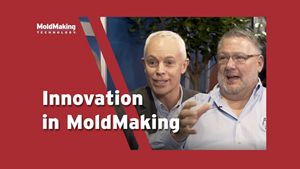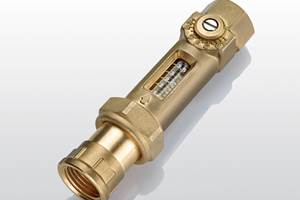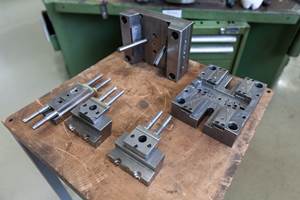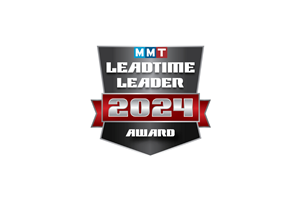Management Session for Moldmakers
Fortifying your vision for success in the changing global economy is essential to achieving total quality management. And if everyone from management down makes a concerted effort, TQM is a goal that any moldmaking shop can achieve.
No matter how much quality training you provide, it will have little impact if your organization's top managers are not involved. This includes involvement in both quality improvement efforts and in the training. The more you can involve your upper management in the training (both as participants and as instructors), the more likely your training will succeed.
Total quality management (TQM), continuous process improvement, process innovation, standards - ISO 9001, QS-9000, FDA GMPs - or whatever you call it, it is likely that you as a moldmaker and molder professional will play a key role in implementing it. This is the article that explains, in the language of moldmakers - how to meet the demands of TQM.
The following steps are required for moldmakers to bring TQM to every area of the shop.
- Creating the implementation plan.
- Gaining commitment from senior management.
- Putting TQM strategies in wide-spread action.
- Working with external technical experts/consultants.
- Designing and delivering training for quality.
- Meeting unique needs brought on by change.
- Preventing common TQM training mistakes.
- Measuring ongoing results.
Because there is so much to teach, trainers often panic and move to a "tell" mode rather than an "experience" mode. Participants must experience some of the things that will happen to them once they get onto the team. Training designers (i.e., The Plastics ISO 9000 Model) should think in terms of creating one activity from which the participants can gain several lessons about teamwork and quality improvements as well as practice using a tool within the methodology. Designers need to be efficient with their time. Also, if the training you provide is not future-focused, it will lose credibility.
The training needs to be candid about what is ahead. Participants need to see that there are challenges ahead and that the skills they learn will help them with those challenges. Remember, the plan must be customized and industry-specific. Someone else's general plan will fail. At the minimum, the following six elements must be addressed in your organization's implementation plan.
- Senior management leadership and support.
- Strategic planning.
- Focus on the customer.
- Employee training and recognition.
- Employee empowerment and team-work.
- Systems approach that encompasses measurement.
A World of Change
The world of moldmaking and molding is changing more rapidly than ever before and the evidence is all around you. Shorter product cycles, heightened competition, the advent of e-commerce, higher productivity goals and increased government regulations - all of these market forces and a hundred others are creating a high-pressure, rapidly-evolving business environment and an increasing squeeze on profitability. Your challenge as a toolmaker and/or manufacturer is to adapt or to fall behind.
It is not your fault, it is not even under your control - but as the rate of change increases every day, you are being forced to look in different directions at once, such as productivity; competition; government regulation; recruiting, training, and retaining good personnel; effective marketing; financing; profitability; operational process improvement and technology upgrades, improvements and breakthroughs.
None of these challenges are new to you - but all of them are becoming critical. If you do not address them now, today, you will find yourself in a whole new world tomorrow - a world where competitors are outdoing you, employees are unhappy, waste is going up, productivity is going down and your profit margin is shrinking with every passing day. You cannot stop it - you cannot even slow it down. But you can manage it.
The good news is that you can make today's rapid change a positive force for your company. The key is to find allies - credible, objective experts who can offer you a fresh perspective and give you practical, cost effective and real solutions. These experts should do more than just give advice. They should work with you, implementing their ideas, keeping focused and engaged throughout the process. They should become a "partner in growth." But what makes an ideal partner in growth?
- A track record of success, covering a wide spectrum of business challenges.
- Experience in tooling and manufacturing, with exactly the kind of business and technological issues you face.
- Expertise that applies to your specific industry in all its depth and complexity.
- Impressive resources - a large array of contacts and supporting sources that give you access to information, technology and insight from across the country.
- A commitment to your ROI (Return On Investment) that will make sure the solutions you are offered are not only practical, but also profitable.
A Business Approach to Standards, Employee Development and Customer Focus
The international standard ISO 9001 and the United States Malcolm Baldrige National Quality Award have been successful methods for businesses to implement and improve their operations. Together they reflect the experiences and accomplishments of companies striving for higher quality. Both are ideal for anyone considering a quality system evaluation, seeking information about the Baldrige and ISO 9001 process or planning to apply for the Baldrige Award and ISO 9001 certification. The road to the Baldrige Award is a unique resource for organizations striving to achieve excellence in operations. Sponsored by the U.S. Department of Commerce since 1988, the Malcolm Baldrige National Quality Award represents the commitment of the United States to total quality in business.
Scores of American companies are dedicated to achieving such quality through continuous improvement. The prestige and influence of the Baldrige Award has grown steadily as the program and its stringent criteria have become more widely known throughout the American business community. American companies have launched successful total quality programs - in many cases turning initial skepticism and apathy into enthusiastic support throughout the organization. The award also gives insight into the experiences and strategies of past award winners and explains how demands are intensifying for all U.S. companies to become world-class competitors.
There are some differences between the standards and the award. For the ISO 9001:2000 process, companies now will be concerned about business processes such as management responsibility, resource management, process management, improve-ment through measurement and analysis and customer focus.
However, for the Baldrige Award, the criteria on which the judging is based falls into seven categories:
1. The ability of a company's leadership to establish a culture that emphasizes quality as a goal.
2. A company's efforts to collect and analyze information to improve quality.
3. A company's effectiveness in incorporating quality into its business plans.
4. A company's utilization of human resources to achieve quality.
5. The effectiveness of a company's quality assurance control programs.
6. Quantitative measurements of the results of those programs.
7. Customer satisfaction, on which there is a heavy emphasis.
Should moldmakers or molders want to get started on the process of qualifying for either process, there are some steps they need to take. First, document and control your shop with an organizational chart - written, thorough job descriptions, responsibilities and procedures designed for job shops and make-to-order manufacturers in order to quote accurately, process orders efficiently, schedule realistically, control material effectively, collect real time data, ship jobs on time and cost jobs accurately. This process involves:
- Tracking jobs - Know the status of any job at any time. There are procedures designed to give you total control with up-to-the-minute information allowing you to deal with changes effectively and run your shop more efficiently.
- Scheduling jobs - Identify problems while there is still time to make corrections, getting the most from your employees, technology and equipment to help reduce profit-eating overtime.
- Costing jobs - Know when a job is running late or over cost and why in order to maximize revenue and profit with real-time analysis of job costs.
The moldmaker or molder also should keep track of quality documents including supplier communications, internal quality communications, customer communications, scrap reports and a quality activity calendar.
In summary, the goal of achieving ISO 9001 certification and the Baldrige Award is possible for any size moldmaker and molder as long as the firm is willing to allocate the resources necessary to properly complete the project. The results will not be achieved overnight, but the successful completion of the project will repay the efforts through increased markets and improved quality.
Related Content
VIDEO:"The Smith Boys" on How Moldmaking is an Innovation Machine
"The Smith Boys" AKA President of DME Peter Smith and Director of Sales, Scott Smith discuss why the moldmaking industry is an innovation machine and how it is crucial to remedying global supply chain issues.
Read MoreFlowmeter Enables Accurate Water Volume Measurement, Regulation
Hasco’s flowmeter, which can be installed anywhere in the direction of flow, aids moldmakers in rapid and easy flow rate readings on injection molds.
Read MoreR&D Tax Credit Refresher
A list of the top 10 moldmaking activities frequently performed through daily business that qualifies for an R&D tax credit.
Read MoreFAQs: What Are the Leadtime Leader Awards?
Here are answers to some frequently asked questions about MoldMaking Technology's annual Leadtime Leader Awards competition.
Read MoreRead Next
How to Use Strategic Planning Tools, Data to Manage the Human Side of Business
Q&A with Marion Wells, MMT EAB member and founder of Human Asset Management.
Read MoreHow to Use Continuing Education to Remain Competitive in Moldmaking
Continued training helps moldmakers make tooling decisions and properly use the latest cutting tool to efficiently machine high-quality molds.
Read MoreAre You a Moldmaker Considering 3D Printing? Consider the 3D Printing Workshop at NPE2024
Presentations will cover 3D printing for mold tooling, material innovation, product development, bridge production and full-scale, high-volume additive manufacturing.
Read More

















.png;maxWidth=300;quality=90)
_300x250 1.png;maxWidth=300;quality=90)


.jpg;maxWidth=300;quality=90)







